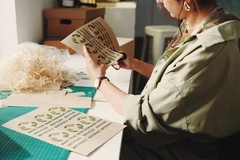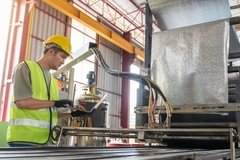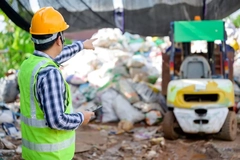Waste pickers on the world stage: Plastic pollution treaty negotiations officially recognize informal collectors
NGOs urge UN to deliver fair financial framework for these “key stakeholders”

01 Dec 2022 --- The International Alliance of Waste Pickers (IAWP), which promotes the importance and role of up 56 million people working informally to collect plastic packaging trash across the globe, has been officially recognized at the ongoing UN International Negotiating Committee (INC) for a global plastics treaty.
Rights advocates are celebrating the decision by 19 UN member states to recognize waste pickers as formal stakeholders in the negotiations as “historic.” This week, civil society groups feared that multi-billion dollar FMCGs, who are also at the negotiations, could derail anti-pollution aims and “tokenize” waste pickers and Indigenous Groups while continuing to profit and stall environmental and human health progress.
However, Magdalena Donoso, regional coordinator of GAIA Latin America and the Caribbean, tells PackagingInsights that “thanks to international organizing, embodied in the recent launch of the IAWP, grassroots waste pickers came to this first INC with a well-developed internal process.”
“This positions them as strong actors with their own voice, and they will not allow themselves to be used,” she says.
In Latin America and the Caribbean, for example, it is estimated that the informal sector provides 50-90% of the recyclable materials used by local industry or exported – yet only receives 5% of the profits.
 Waste collectors play an essential role in reducing plastic pollution but earn minute profits.A new era for waste workers?
Waste collectors play an essential role in reducing plastic pollution but earn minute profits.A new era for waste workers?
GAIA says this moment marks an unprecedented recognition of the informal waste sector’s rights, skills and importance. Never before have countries formally committed to advocating on behalf of waste pickers in the context of international negotiations.
The organization says that the inclusion of waste pickers in the negotiations signals that countries are acknowledging the pivotal role that waste pickers play in creating solutions to the plastic crisis and should therefore be recognized as key stakeholders in the treaty process.
Between 12.6 to 56 million people work in the informal recycling sector and, in many places, their efforts account for almost all of the materials recycled in their municipalities. Despite this, waste pickers often go unrecognized or compensated by their local governments and work in undignified conditions.
The core demand of waste picker groups is to develop a just transition plan, which must include adequate compensation for services, opportunities for self-employment, a key role in the plastic value chain, entrepreneurship and a role in the creation and implementation of policies to end the plastic crisis at a local and international level.
Demands and challenges ahead
The transition plan now faces a key hurdle: making the recognition of waste pickers’ demands binding and ensuring legal implementation across all member states.
 Waste pickers will have proper international representation for the first time at the UN plastic treaty negotiations.Soledad Mella, president of the National Association of Waste Pickers Chile, communications secretary RedLacre, says: “Now, the biggest challenge is that the process is truly binding and that they take into account our demand – which is a just transition that guarantees the participation of waste pickers in the entire recycling chain and every negotiation, and that the laws that will be implemented see waste pickers as a fundamental part of the recycling chain.”
Waste pickers will have proper international representation for the first time at the UN plastic treaty negotiations.Soledad Mella, president of the National Association of Waste Pickers Chile, communications secretary RedLacre, says: “Now, the biggest challenge is that the process is truly binding and that they take into account our demand – which is a just transition that guarantees the participation of waste pickers in the entire recycling chain and every negotiation, and that the laws that will be implemented see waste pickers as a fundamental part of the recycling chain.”
The key demands of the IAWP are the following:
- A definition of Just Transition and a description of waste pickers in the draft text for the negotiations.
- A negotiating cluster dedicated to Just Transition.
- The commissioning of a report highlighting the contribution of waste pickers in recycling and reducing plastic pollution, where waste pickers will provide input.
- Financial support to attend international negotiations.
Adja Mame Seyni Paye Diop, vice president of the Waste Pickers from Senegal, says: “What I expect from this treaty and this meeting is that people take our jobs into account. For me, a just transition is having alternative jobs to support our families when it comes time to close dump sites.”
Expropriating polluting profits
Donoso says that the waste pickers alliance submission to the member states has several points of agreement with GAIA’s vision. “We are grateful as an alliance to be able to walk hand in hand with the outside workers in this process. Among other points, the waste pickers bring two proposed definitions to the INC, one on just transition and one on waste pickers.”
The IAWP definition of transition states, “is defined as ending plastic pollution in a way that is as fair and inclusive as possible to everyone concerned, creating decent work opportunities and leaving no one behind.”
“It involves maximizing the social and economic opportunities of ending plastic pollution while minimizing and carefully managing any challenges - including through effective social dialogue among all groups impacted, and respect for fundamental human rights.”
The alliance has also requested financial support to ensure their participation in upcoming INCs.
“We believe that the impact of their participation in this space will be key, as it will contribute to building a collective discourse toward the urgency of reducing the production of plastics and eliminating toxins, all with a rights-based approach,” Donoso concludes.
By Louis Gore-Langton










